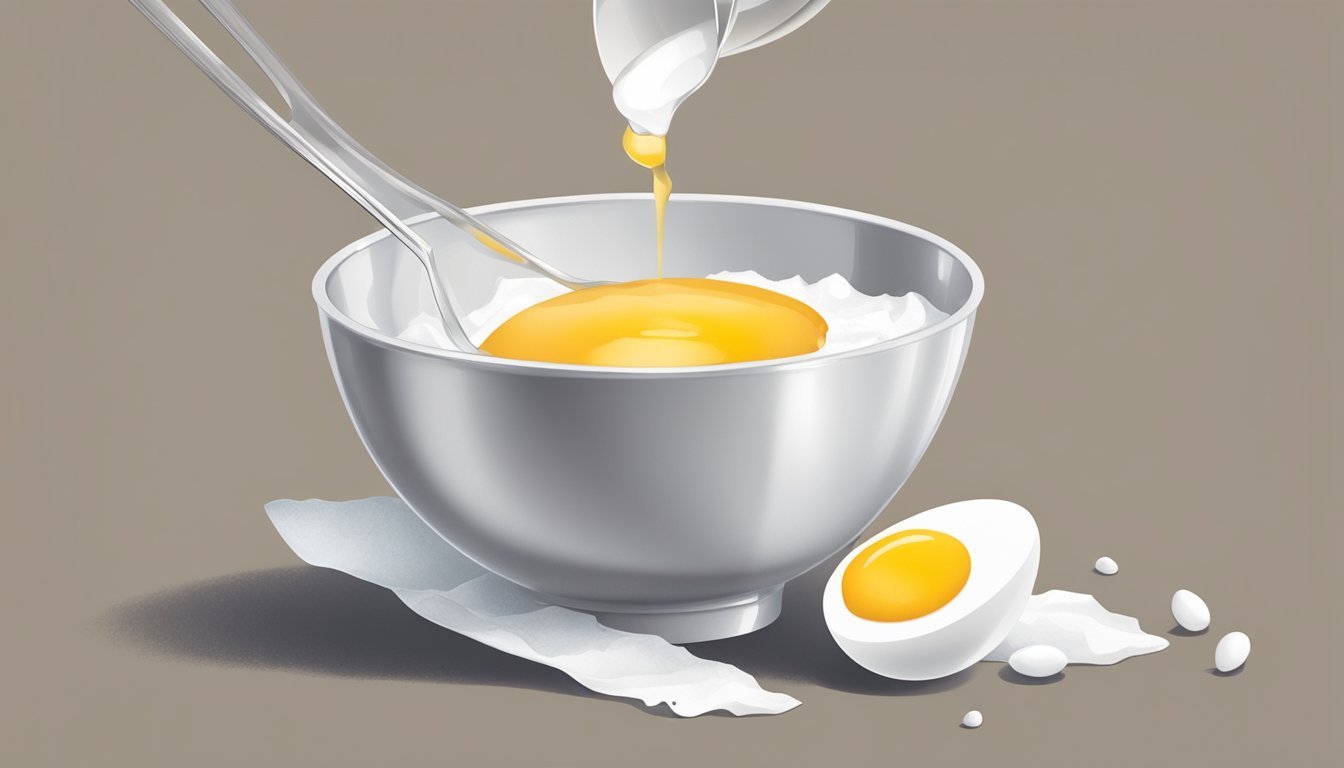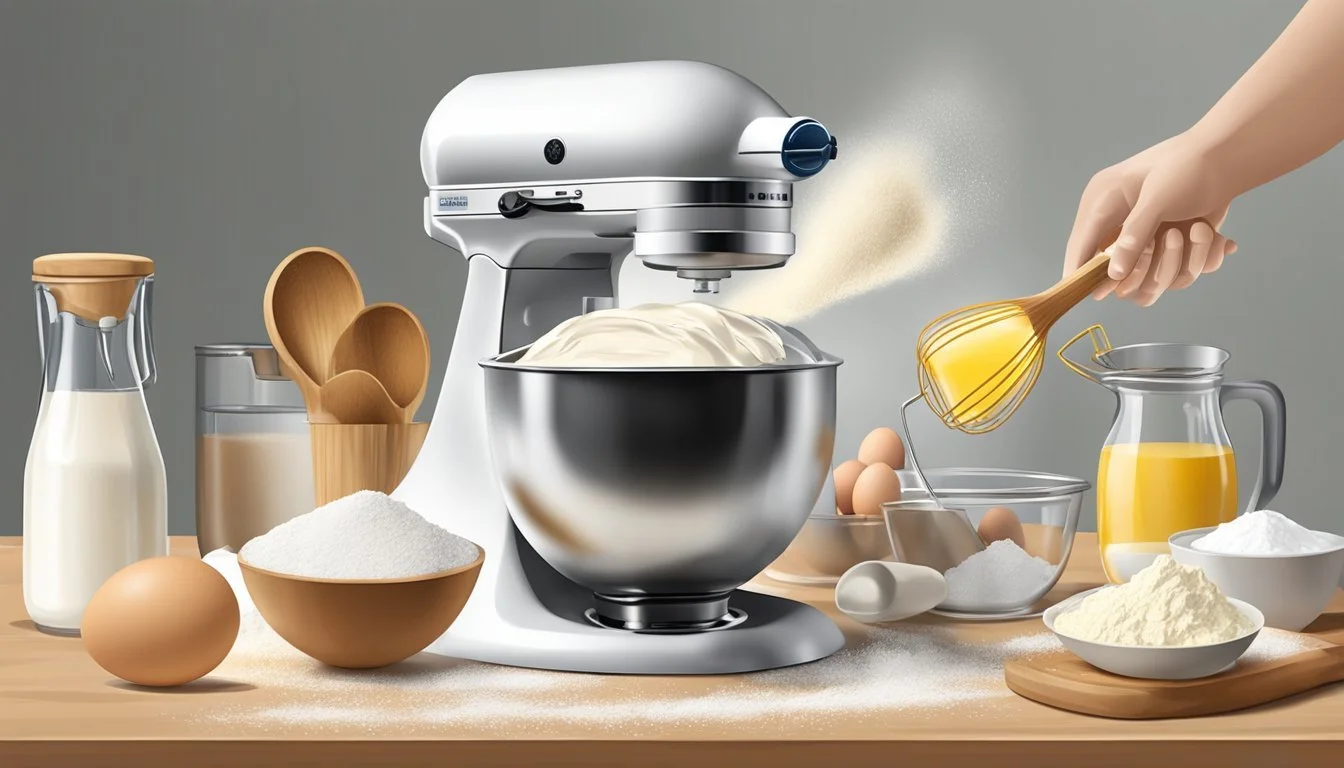How to Substitute Egg Whites for Whole Eggs
A Guide for Healthier Baking
When baking, it's common to encounter recipes that call for whole eggs, yet dietary preferences, allergies, or simply a lack of eggs may necessitate a substitute. Egg whites can serve as an excellent alternative to whole eggs in many baking recipes. The substitution is not only straightforward but also has the potential to reduce the fat and cholesterol content of the baked goods. It's advantageous to understand how to successfully replace whole eggs with egg whites to ensure that the desired texture and structure of baked items are maintained.
Egg whites are largely composed of water and proteins, which makes them capable of providing structure and leavening to baked goods, similar to whole eggs. However, the absence of fat, which is present in the yolk, means that the richness and color of the dish may be altered. Typically, two egg whites or 1/4 cup of an egg substitute can replace one whole egg, but the exact ratio can vary depending on the characteristics of the recipe at hand.
A seamless transition from whole eggs to egg whites in baking requires careful measurement and consideration of the recipe's needs. While egg whites can impart a lighter texture to cakes (how long do cakes last?) and cookies, they might not provide the same moisture as yolks, which needs to be accounted for. Determining when and how to use egg whites in place of whole eggs is crucial for achieving the best results without compromising the integrity of the final product.
Understanding Egg Composition
Eggs are a versatile ingredient in cooking and baking, with their whites and yolks providing distinct functions and nutritional profiles.
Role of Egg Whites and Yolks in Recipes
Egg whites and yolks serve different purposes in recipes. Egg whites are primarily made up of water and proteins, which contribute to the structure and leavening in baked goods. They are used in recipes to create airy textures and to act as a binding agent. On the other hand, egg yolks contain fats, proteins, and emulsifiers such as lecithin, which add richness and color to dishes. The yolk's emulsifying properties create a stable mixture of ingredients that would otherwise separate.
Nutritional Profile of Egg Whites Versus Whole Eggs
When comparing the nutritional profile of egg whites to whole eggs, one observes significant differences in protein, fat, and cholesterol content.
Protein: Egg whites are an excellent source of high-quality, low-calorie protein. Nearly 60% of the total protein in an egg comes from the white.
Fat: Egg yolks are the main source of fat in an egg. They contain essential fatty acids and fat-soluble vitamins, absent in egg whites.
Cholesterol: Whole eggs are known for their cholesterol content, which is found in the yolk. Egg whites are cholesterol-free.
Here's a comparative table highlighting their nutritional differences:
Nutrient Egg Whites Whole Eggs Egg Yolks Protein High Moderate Moderate Fat Trace amounts Moderate High Cholesterol None High High
It's crucial for a user to understand these distinctions when substituting whole eggs with egg whites, as it will affect both the outcome of the recipe and its nutritional content.
Substituting Egg Whites for Whole Eggs
When replacing whole eggs with egg whites in recipes, it’s important to achieve the right balance as egg whites contribute to both the structure and volume of baked goods, without the fat and flavor of the yolks.
Finding the Right Ratio
For most baking recipes, two egg whites or 1/4 cup of a liquid egg substitute can replace one whole egg. It’s crucial to measure accurately since egg whites are mainly water and proteins, and their lack of fat affects both texture and flavor.
Whole Eggs Egg Whites Liquid Egg Substitute 1 2 1/4 cup 2 4 1/2 cup 3 6 3/4 cup
Adjustments for Texture and Flavor
Texture can be compromised when omitting the yolks, as they lend richness and tenderness to baked goods. To counteract this, one may need to add a tablespoon of oil or butter for every two to three egg whites used. Flavor may also need to be enhanced with an increase in spices or vanilla extract, as yolks carry flavor.
Common Uses in Baking and Cooking
Egg whites are frequently used in recipes that require a lighter, airier texture, such as angel food cake or meringues. They provide volume and structure to these types of dishes, often being whipped into stiff peaks before folding into the batter. Careful incorporation of egg whites can maintain the desired consistency in cakes, cookies, and other confections.
Alternative Egg Substitutes
When substituting egg whites in recipes, cooks have several reliable alternatives at their disposal. These can be broadly categorized into plant-based, dairy-based, and commercial options, each offering distinct properties that can mimic the qualities of egg whites in various types of dishes.
Plant-Based Options
Aquafaba: The liquid from canned beans, most notably chickpeas, serves as an excellent egg white substitute. For every egg white, three tablespoons of aquafaba can be used.
Flaxseed: When ground and mixed with water, flaxseed forms a gel that can act as a binder. To replace one egg white, one tablespoon of flax meal with three tablespoons of water is generally used.
Chia Seeds: Similar to flaxseed, chia seeds can absorb water and develop a gel-like consistency. One tablespoon of chia seeds mixed with three tablespoons of water can substitute for an egg white.
Applesauce: As a fruit puree, unsweetened applesauce provides moisture to recipes. One-fourth cup can replace one egg white, but adjustments may be needed if the applesauce is sweetened.
Dairy-Based Alternatives
Yogurt: Plain, unsweetened yogurt can contribute moisture and fat as a substitute. Two tablespoons of yogurt can typically replace one egg white.
Silken Tofu: Soft and blendable, silken tofu can act as a neutral option. Approximately a quarter cup, when blended until smooth, is the standard measure to replace one egg white.
Commercial Egg Replacers
Pre-made Replacers: Available in most grocery stores, these products are specifically formulated to emulate egg whites. The packaging will provide precise instructions for replacing egg whites, typically involving mixing a specified amount of powder with water.
From aquafaba to commercial egg replacers, these substitutes allow individuals with dietary restrictions or preferences to enjoy a wide range of recipes without compromising on taste or texture. Each option offers unique benefits, and the choice largely depends on the desired outcome of the recipe.
Impact on Baked Goods
When substituting egg whites for whole eggs in baked goods, one must consider how this change will affect the structure, moisture, and tenderness of the final product.
Effects on Cakes, Cookies, and Muffins
Cakes: Substituting egg whites for whole eggs in cake recipes can result in a lighter texture, as the whites contribute to leavening. However, they lack the fat content of yolks, which may lead to a reduction in the cake's moisture and richness.
Moisture: Without the yolks, cakes might be less moist. To counteract this, additional sources of fat could be included.
Tenderness: Cakes may also become less tender, as the fat from yolks typically helps soften the crumb.
Cookies: Cookies made with only egg whites can be crunchier and spread less, which might be ideal for some recipes.
Structure: The lack of fat may make cookies more solid, so adjustments in baking time or temperature might be needed.
Muffins: Muffins require moisture and tenderness, which can be compromised when using egg whites alone.
Adjustments: Consider adding an extra tablespoon of oil or butter to compensate for the moisture and texture difference.
Considerations for Desserts and Custards
Desserts: Many desserts rely on the rich flavor and creamy texture provided by egg yolks.
Flavor: Egg whites will not provide the same depth of flavor as whole eggs.
Texture: Desserts might not set as firmly because yolks act as an emulsifier and thickening agent.
Custards (how long do custards last?): The absence of yolks in custard can drastically change its consistency.
Cohesion: Yolks are essential for the proper thickening of custards; without them, custards may be runnier and less cohesive.
Substitutes: Incorporating thickeners like cornstarch can help achieve a firmer set when using only egg whites.
The differences in fat and emulsifiers between whole eggs and egg whites must be accounted for to maintain the integrity of baked goods, desserts, and custards.
Technical Aspects of Egg Replacements
In substituting egg whites for whole eggs, one must consider the loss of yolks which contribute to leavening, emulsifying, and structure-building in baking. The replacement strategy should aim to replicate these properties using alternative ingredients or adjustments.
Leavening and Emulsifying Properties
Egg yolks naturally act as an emulsifier, thanks to their lecithin content. They help blend water and fat, creating a stable mixture that results in a uniform texture in baked products. Egg whites do not contain the same level of emulsifying agents, which means bakers might need to introduce additional elements, such as baking powder or sour cream, to achieve the desired consistency.
For leavening, baking powder can serve as a substitute:
Add 1/4 teaspoon of baking powder for each egg white used to preserve the product's volume and lightness.
To compensate for the loss of emulsification:
Incorporating a tablespoon of sour cream or a similar product can provide the needed fat content and emulsifying action.
Creating Stability and Building Structure
With whole eggs, the proteins found in both the yolks and whites provide stability and help in building structure within the batter or dough. However, using only egg whites means losing the structural benefits that yolks offer. To address this, bakers might need to modify the quantity and whipping process of the egg whites:
Whipped egg whites should be gently folded into the mixture to incorporate air and provide stability.
Improving structure without yolks might require increased precision in mixing. Overbeating can lead to a collapse in texture, while underbeating could result in a dense product.
In applications where the binding and structure-building properties of the egg are paramount, careful adjustments must be made when using egg whites as a substitute to ensure the final product retains its desired characteristics.
Practical Tips and Tricks
When substituting egg whites for whole eggs, it's important to use reliable conversion charts, minimize waste, and adjust recipes for egg sizes to maintain the integrity of the dish.
Using Conversion Charts
A conversion chart is a helpful tool for accurately substituting egg whites for whole eggs. Below is a simple chart for reference:
Whole Eggs Egg Whites Egg Substitute 1 whole egg 2 egg whites (about 1/4 cup) 1/4 cup of egg substitute
For precise baking, maintaining the right proportions is crucial, so adhering to a chart like this helps ensure successful results.
Minimizing Waste While Substituting
When using fresh eggs, to avoid waste, consider how the remaining yolks can be utilized in other recipes such as custards or sauces. If using carton egg whites, measure carefully to match the required amount of whole eggs. When cracking and separating eggs, perform the task cleanly to ensure maximum yield of egg whites.
Recipe Adjustments for Different Egg Sizes
Recipe success often depends on using the correct size of eggs. The standard size used in recipes is 'large.' Here’s a quick guide for adjusting the number of egg whites when different sized eggs are being substituted:
Egg Size Number of Egg Whites to Substitute One Whole Egg Small 2 to 3 egg whites Medium 2 egg whites Large 2 egg whites Extra Large 1 to 2 egg whites
Adapt the quantity of egg whites based on the size to achieve the texture and structure intended by the recipe.
Health Considerations
When substituting egg whites for whole eggs, one must consider both the reduction of dietary fats and cholesterol intake as well as the need to address various allergies and dietary restrictions.
Reducing Fat and Cholesterol Intake
Whole eggs contain dietary cholesterol and saturated fats, mostly located within the yolk. One large egg has approximately 1.6 grams of saturated fat and 186 milligrams of cholesterol. By substituting egg whites for whole eggs, individuals can significantly reduce these amounts as egg whites contain no cholesterol and negligible amounts of fat.
Whole Egg:
Calories: 72 kcal
Fat: 5 g
Saturated Fat: 1.6 g
Cholesterol: 186 mg
Two Egg Whites:
Calories: ~34 kcal
Fat: 0 g
Saturated Fat: 0 g
Cholesterol: 0 mg
This makes egg whites a favorable option for those monitoring their cholesterol levels or following a diet lower in saturated fat.
Dealing with Egg Allergies and Dietary Restrictions
Egg allergies are often triggered by proteins present in the egg white, the yolk, or both. For those allergic to only the yolk, using egg whites may be a viable alternative. However, if one is allergic to proteins in the egg whites or to eggs in general, they should avoid eggs altogether and look for a different substitute, such as soy lecithin or aquafaba.
Egg White Proteins: Can cause allergies in some individuals
Soy Lecithin: A potential vegan substitute devoid of egg proteins
Aquafaba: The liquid from canned chickpeas, another vegan alternative, can be used to replicate the properties of egg whites in recipes
Individuals following vegan diets, which exclude all animal products, can utilize these plant-based substitutes to avoid eggs while still enjoying a variety of dishes traditionally made with eggs.
Innovative Egg White Alternatives
In recent years, the quest for egg white substitutes has led to several innovative ingredients that cater to vegan diets and allergy concerns. These alternatives often replicate the binding and leavening properties of egg whites in baking and cooking.
Using Aquafaba and Other Novel Ingredients
Aquafaba, the liquid from a can of chickpeas, has emerged as a remarkable plant-based replacement for egg whites due to its ability to mimic their consistency and function in recipes. It contains proteins and carbohydrates that allow it to be whipped into a foam, just as one would with egg whites, making it an ideal ingredient for meringues, mousses, and more. To substitute for one egg white, three tablespoons of aquafaba are recommended.
Utilizing innovative ingredients like liquid egg white substitutes—which exclude yolks and are pasteurized—offers a high-protein, low-fat option for health-conscious individuals. These substitutes are often enriched with added vitamins and can usually be used in a 1:1 ratio to replace egg whites, ensuring convenience without compromise.
The Future of Vegan Baking with Egg Whites
As vegan baking continues to evolve, the importance of substitutes that can perform the duties of egg whites becomes paramount. Proteins found in plant-based alternatives not only fulfill the nutritional aspects but also play a crucial role in achieving the desired textures in vegan baked goods. Products like liquid vegan egg whites are also gaining popularity. These products are specifically formulated to have similar baking properties to real egg whites, which makes them a straightforward one-to-one substitute in recipes.







